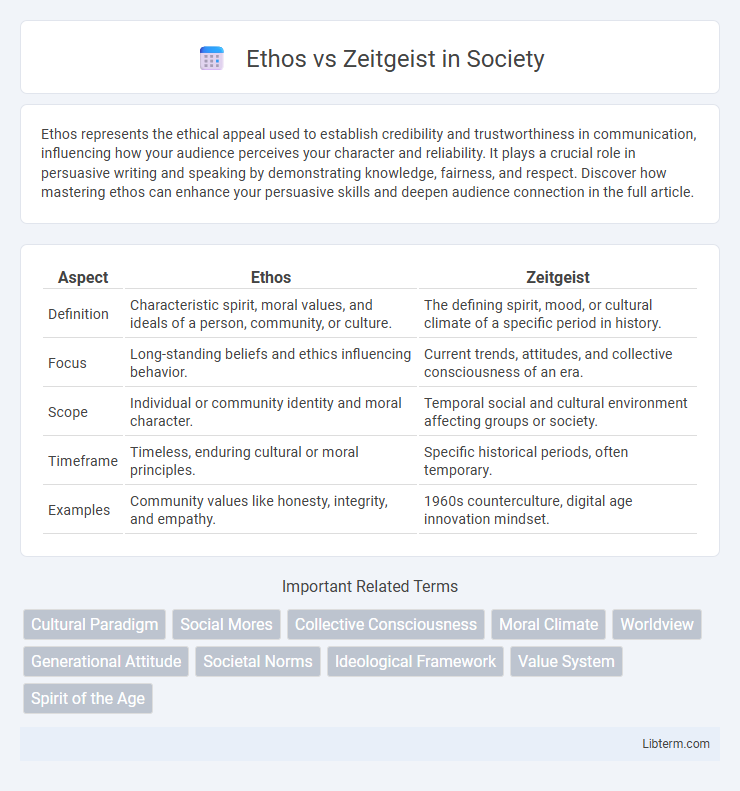Ethos represents the ethical appeal used to establish credibility and trustworthiness in communication, influencing how your audience perceives your character and reliability. It plays a crucial role in persuasive writing and speaking by demonstrating knowledge, fairness, and respect. Discover how mastering ethos can enhance your persuasive skills and deepen audience connection in the full article.
Table of Comparison
| Aspect | Ethos | Zeitgeist |
|---|---|---|
| Definition | Characteristic spirit, moral values, and ideals of a person, community, or culture. | The defining spirit, mood, or cultural climate of a specific period in history. |
| Focus | Long-standing beliefs and ethics influencing behavior. | Current trends, attitudes, and collective consciousness of an era. |
| Scope | Individual or community identity and moral character. | Temporal social and cultural environment affecting groups or society. |
| Timeframe | Timeless, enduring cultural or moral principles. | Specific historical periods, often temporary. |
| Examples | Community values like honesty, integrity, and empathy. | 1960s counterculture, digital age innovation mindset. |
Understanding Ethos: Definition and Importance
Ethos refers to the character, credibility, and ethical appeal that a speaker or writer establishes to persuade an audience. It is crucial in communication as it builds trust, demonstrating authority and integrity, which enhances the effectiveness of the message. Understanding ethos allows individuals and organizations to craft compelling arguments that resonate authentically with their target audience, fostering engagement and influence.
What is Zeitgeist? Unpacking the Concept
Zeitgeist refers to the dominant set of ideas, beliefs, and cultural climate that define a specific era, shaping collective social behaviors and attitudes. It encapsulates the spirit of the times, influenced by historical events, technological advancements, and prevailing ideologies. Understanding Zeitgeist helps explain how societal values evolve and impact art, politics, and public discourse during different periods.
Ethos vs Zeitgeist: Core Differences
Ethos represents the fundamental character, values, and beliefs that define a specific culture or group, while Zeitgeist captures the dominant spirit or mood of a particular historical era. Ethos is enduring and rooted in long-standing traditions, whereas Zeitgeist is transient, reflecting contemporary societal attitudes and trends. Understanding these core differences clarifies how ethos shapes identity over time, while zeitgeist influences collective behavior in specific moments.
Historical Examples of Shifting Ethos
Historical examples of shifting ethos illustrate how societal values and collective moral character evolve in response to changing zeitgeists. The transition from the Victorian era's rigid ethical codes to the more liberal attitudes of the 1960s exemplifies a profound shift in cultural ethos influenced by new social movements and changing political climates. Similarly, the post-World War II embrace of individualism and civil rights in the United States reflected a zeitgeist that prioritized equality and personal freedom, reshaping the nation's collective ethos.
Zeitgeist's Influence on Culture and Society
Zeitgeist represents the prevailing spirit or mood of a particular period, shaping cultural norms, societal values, and collective behaviors through dominant ideas and attitudes. Its influence permeates art, politics, technology, and social movements, reflecting the collective consciousness and driving cultural evolution. By encapsulating the dominant trends and ideologies, Zeitgeist serves as a powerful force that molds public opinion and societal development.
How Ethos Shapes Collective Identity
Ethos shapes collective identity by embedding shared values, principles, and cultural norms that guide group behavior and decision-making processes. This underlying character serves as a foundational framework influencing social cohesion and reinforcing communal bonds over time. Collective identity thus emerges as an expression of the group's internalized ethos, distinguishing it from other social entities.
Zeitgeist and Its Role in Social Movements
Zeitgeist, defined as the prevailing spirit or mood of a particular period, plays a critical role in shaping social movements by reflecting collective consciousness and societal values. It drives the momentum of movements through shared cultural attitudes, norms, and ideas that resonate with broad populations during specific historical contexts. Understanding zeitgeist allows activists and scholars to anticipate shifts in public opinion and tailor strategies that align with evolving societal priorities.
The Interplay Between Ethos and Zeitgeist
Ethos represents the character or guiding beliefs of a person, group, or culture, shaping values and ethical principles that influence behavior. Zeitgeist captures the spirit or cultural climate of a specific era, reflecting prevailing ideas, attitudes, and social trends shared by a society during that time. The interplay between ethos and zeitgeist reveals how enduring values interact with contemporary social moods, collectively driving cultural evolution and shaping societal norms.
Modern Contexts: Ethos vs Zeitgeist Today
Ethos in modern contexts reflects the core values and ethical principles that shape individual and organizational identities, emphasizing authenticity and integrity. Zeitgeist represents the prevailing cultural mood and collective consciousness influenced by technological advancements, social movements, and global events. Understanding the interplay between ethos and zeitgeist helps businesses and societies navigate evolving expectations while maintaining consistent moral frameworks.
Why Ethos and Zeitgeist Matter in Contemporary Discourse
Ethos and Zeitgeist shape contemporary discourse by influencing societal values and collective behavior, with Ethos representing the moral character and credibility of individuals or institutions, and Zeitgeist embodying the spirit or cultural climate of a particular era. Understanding Ethos helps in evaluating the trustworthiness and ethical grounding of arguments, while grasping Zeitgeist allows for contextualizing ideas within the prevailing social and historical framework. Together, they guide the interpretation of narratives and drive informed dialogue in modern communication.
Ethos Infographic

 libterm.com
libterm.com